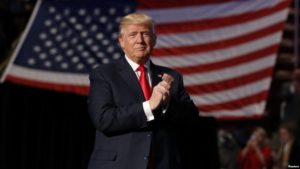by WorldTribune Staff, December 23, 2016
Egypt withdrew an anti-Israeli settlement resolution it planned to submit to the UN Security Council about an hour after U.S. President-elect Donald Trump came out against it.
“The resolution being considered at the United Nations Security Council regarding Israel should be vetoed,” Trump said in a statement on Dec. 22.

Egypt had circulated a draft of the resolution on Dec. 21. The proposal stated that the settlements “have no legal validity,” are a flagrant violation of international law, and are “a major obstacle to the achievement of the two-state solution and a just, lasting and comprehensive peace.”
Egyptian President Abdul Fatah Sisi called Trump hours after the UN Security Council postponed a vote on the resolution.
“During the call they discussed regional affairs and developments in the Middle East and in that context the draft resolution in front of the Security Council on Israeli settlements,” said Sisi’s spokesman, Alaa Yousef.
“The presidents agreed on the importance of affording the new U.S. administration the full chance to deal with all dimensions of the Palestinian case with a view of achieving a full and final settlement.”
Trump, in his statement, said that “as the United States has long maintained, peace between the Israelis and the Palestinians will only come through direct negotiations between the parties, and not through the imposition of terms by the United Nations. This puts Israel in a very poor negotiating position, and is extremely unfair to all Israelis.”
Israel’s ambassador to Washington, Ron Dermer, posted on Twitter that Israel “deeply appreciates” Trump’s “clear and unequivocal call” to veto the resolution.
Prior to Trump’s statement, Israeli officials were concerned that President Barack Obama, who opposes the settlements, might not use the U.S. veto in the Security Council to shield Israel from the resolution.
Israeli Prime Minister Benjamin Netanyahu tweeted that “the U.S. should veto the anti-Israel resolution,” and issued an even sharper statement again just before the Egyptians announced that they were pulling back the resolution.
“Israelis deeply appreciate one of the great pillars of the U.S.-Israel alliance: the willingness over many years for the U.S. to stand up in the UN and veto anti-Israel resolutions,” he said. “I hope the U.S. won’t abandon this policy; I hope it will abide by the principles set by President Obama himself in his speech in the UN in 2011: that peace will come not through UN resolutions, but only through direct negotiations between the parties.”
It was not immediately clear whether a vote on the matter would be rescheduled for a later date.
Israeli Ambassador to the UN Danny Danon urged caution, saying that while “the delay of the vote is an important step,” the issue is not yet resolved. “We are continuing our diplomatic efforts on all fronts to ensure that this disgraceful resolution will not pass the Security Council,” he said.
An Egyptian diplomat suggested that Cairo may have put off the vote to maintain good relations with the incoming Trump administration.
“We [Arab states] are all looking for a way to ensure constructive relations with this new administration,” said the diplomat. “It’s not clear if this [resolution] helps that, or if it might even hinder.”
